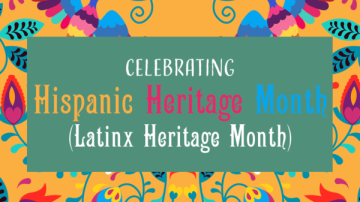Hispanic Heritage Month is an Opportunity to Shine a Light On Our Stories
Hispanic Heritage Month started in 1988 in the U

Hispanic Heritage Month started in 1988 in the U.S. as a way to celebrate the contributions made by people from Latin America but in the last 33 years we’ve seen little improvement in the actual treatment of the growing Latin community in the U.S. The border crisis, the plight of the undocumented and immigrants in general, and the economic and racial injustices we face continue and yet we are expected to accept the one month of the year where people in power take interest in our stories. The onslaught of media coverage surrounding HHM means mainstream media, brands, and studios will jump at the opportunity to capitalize on appealing to a community that’s grown to 60 million in the U.S. and counting. Of course this is nothing new but what has changed in roughly the past decade is the use of social media which has given anyone with internet access a platform. Some of these internet communities have empowered us, informed us, and educated us and given way to a generation better equipped with the vocabulary and understanding to examine our identities within the diaspora.
So what does this mean for HHM in 2021? It means we are not satisfied with major retailers only taking interest in us from Sept. 15-Oct.15. It means our stories are more than just a trending topic worth covering for one month out of the year. It means we’re also dismantling the limited identifiers placed upon us, instead embracing terms that are better aligned with who we are. The title itself is problematic for many when the term “Hispanic” refers to someone from Spain but those of us from Latin America prefer to be identified as Latino/Latina/Latinx/Latine. The last two have grown in popularity (there’s even a push to rename it Latinx Heritage Month) in the last few years as gender neutral terms that Gen Y and Gen Z have adapted though older generations reject but neither is exclusive to one generation or nationality. Social media has allowed for us to dissect and analyze what it means to be someone from Latin America or of Latin American descent living in the U.S. How can one term possibly identify all of LATAM which is made up of Mexico, Central America, South America and Caribbean islands? Not to mention how both terms by definition exclude the Indigenous communities in LATAM as well as the fact that we rarely see Afro-Latinxs represented let alone Asian, Jewish, and other Latinxs. We are not the spicy Latina trope or the gangsters we are often depicted as in film/television, we are not one-dimensional and we are not our stereotypes. Now many are also decolonizing their identities and learning to connect with their Indigenous roots. HHM does not, nor can it, fully encompass Latinidad.
So while we acknowledge the commodification of HHM to benefit corporations instead of amplifying our community, we want to take this month-long opportunity to empower and elevate OUR STORIES. We also want to recognize the work (and free labor) of content creators who continue to use their platforms to inform and uplift Latinxs. Writer Prisca Dorcas Mojica Rodriguez recently published her first book, For Brown Girls with Sharp Edges and Tender Hearts, but as the founder of Latina Rebels she’s long been using her platform to examine Latinidad. Locatora Radio hosts Mala Muñoz and Diosa Femme regularly discuss topics that rarely get national mainstream attention including Faketinas/tinos, online brujeria, and femme rage. Activist and writer Julissa Arce uses her social platforms to raise awareness of racial injustice and police brutality while also writing about identity. Social accounts like @theafrolatindiaspora on Instagram and @kuiahuitl on TikTok are using their platforms to amplify Afro-Latinx and Indigenous communities, respectively. Jefas like Julissa Prado of Rizos Curls, Patty Delgado of Hija de tu Madre, Kim Guerra of Brown Badass Bonita, and Jen Zeano of Jen Zeano Designs are not just using their brands to empower, they’re making space for Latinx representation in their respective industries. Financial experts like Kara Perez of Bravely Go and Katia Chesnok of Economikat are working to improve financial literacy among BIPOC and provide the tools necessary to begin to build generational wealth. Then there’s the work of creators like Gloria Lucas of Nalgona Positivity Pride promoting body liberation, Jacqueline Garcia (@therapylux) and Adriana Alejandre of Latinx Therapy who are destigmatizing mental health in the Latinx community. Esoteric Esa and Christine Gutierrez are reclaiming ancestral spiritual practices and teaching others how to do the same. Dr. Jessica Hernández is introducing Indigenous science into discussions on climate change and Indigenous activist Helena Gualinga, who is of the Kichwa people of the Ecuadorian Amazon called Sarayaku, is advocating for her environment. These are the stories and people we celebrate not just during HHM but all year long.
We invite our followers to do the same and take this opportunity to let major retailers and mainstream media know about the work of these Latinx leaders, content creators, entrepreneurs, activists, educators, and advocates. While we haven’t been around nearly as long as legacy publications like the New York Times, it’s Latinx-media that mainstream pubs often pull from when they want to tell our stories. Our team is not nearly as large nor do we have the same resources but we will continue to tell these stories and honor the work being done by fellow Latinxs who have the same mission and who also recognize the diversity that makes up the LATAM diaspora. Seguimos adelante unidos.

















